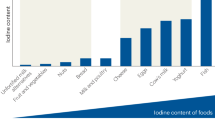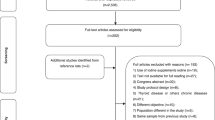Abstract
Selenium and iodine are trace elements that are maximally concentrated in the thyroid. Iodine is a substrate for thyroid hormone synthesis, while the selenoproteins protect the thyroid from the oxidative stress incurred. We measured plasma selenium concentration in 241 pregnant women in 1st trimester, previously reported to have iodine deficiency. Mean age was 30.3 years (SD 5.4), BMI 26.2 kg/m2 (SD 4.9) and 53% reported taking supplements. Median urinary iodine concentration was 73 μg/L (IQR 37–122) (WHO recommendation, ≥150 μg/L). Mean plasma selenium concentration was 75 µg/L (SD 7.7) which is below the 80–125 µg/L reported to be optimal. Four-day food diaries revealed a selenium intake of 43 µg/day (SD 15.9), also below the 55–70 µg/day reported to be optimal. This is the first report of selenium status in pregnancy on the island of Ireland. The possible combined effects of iodine and selenium deficiencies in pregnancy merit further investigation.
This is a preview of subscription content, access via your institution
Access options
Subscribe to this journal
Receive 12 print issues and online access
$259.00 per year
only $21.58 per issue
Buy this article
- Purchase on Springer Link
- Instant access to full article PDF
Prices may be subject to local taxes which are calculated during checkout
Similar content being viewed by others
References
Rayman MP, Duntas L. Selenium deficiency and thyroid disease: a comprehensive guide for the clinician, 1st ed. Switzerland: Springer; 2019.
SACN statement on selenium and health. https://www.gov.uk/government/publications/sacn-statement-on-selenium-and-health-. Accessed 01 May 2020
Combs GF Jr. Selenium in global food systems. Br J Nutr. 2001;85:517–47.
World Health Organization/International Council for the Control ofthe Iodine Deficiency Disorders/United Nations Children’s Fund. Assessment of the iodine deficiency disorders and monitoring their elimination. Geneva; 2007. https://www.who.int/nutrition/publications/micronutrients/iodine_deficiency/WHO_NHD_01.1/en/. Accessed 03 Sept 2020
Vanderpump MP, Lazarus JH, Smyth PP, et al. Iodine status of UK Schoolgirls: a cross‐sectional survey. Lancet. 2011;377:2007–12.
McMullan P, Hamill L, Doolan K, Hunter A, McCance D, Patterson C, et al. Iodine deficiency among pregnant women living in Northern Ireland. Clin Endocrinol. 2019;91:639–45.
Bath SC, Steer CD, Golding J, Emmett P, Rayman MP. Effect of inadequate iodine status in UK pregnant women on cognitive outcomes in their children: results from the Avon Longitudinal Study of Parents and Children (ALSPAC). Lancet. 2013;382:331–7.
Dineva M, Fishpool H, Rayman MP, Mendis J, Bath SC. Systematic review and meta-analysis of the effects of iodine supplementation on thyroid function and child neurodevelopment in mildly-to-moderately iodine-deficient pregnant women. Am J Clin Nutr. 2020:nqaa071. https://doi.org/10.1093/ajcn/nqaa071.
Institute of Medicine, Food and Nutrition Board. Dietary reference intakes: vitamin C, vitamin E, selenium and carotenoids. Washington DC: National Academy Press; 2000
Scientific Opinion on Dietary Reference Values for selenium. EFSA J. 2014;12:3846. http://www.efsa.europa.eu/en/efsajournal/pub/3846. Accessed 01 May 2020
Mao J, Pop VJ, Bath SC, Vader HL, Redman CW, Rayman MP. Effect of low-dose selenium on thyroid autoimmunity and thyroid function in UK pregnant women with mild-to-moderate iodine deficiency. Eur J Nutr. 2016;55:55–61.
Rayman MP, Bath SC, Westaway J, Williams P, Mao J, Vanderlelie JJ, et al. Selenium status in U.K. pregnant women and its relationship with hypertensive conditions of pregnancy. Br J Nutr. 2015;113:249–5.
Bingham SA, Welch AA, McTaggart A, Mulligan AA, Runswick SA, Luben R, et al. Nutritional Methods in the European Prospective Investigation of Cancer in Norfolk. Public Health Nutr. 2001;4:847–58.
Author information
Authors and Affiliations
Corresponding author
Ethics declarations
Conflict of interest
The authors declare that they have no conflict of interest.
Additional information
Publisher’s note Springer Nature remains neutral with regard to jurisdictional claims in published maps and institutional affiliations.
Rights and permissions
About this article
Cite this article
Mullan, K.R., McMullan, P., Hunter, A. et al. Selenium status in a Northern Irish pregnant cohort with iodine deficiency. Eur J Clin Nutr 75, 403–405 (2021). https://doi.org/10.1038/s41430-020-00721-4
Received:
Revised:
Accepted:
Published:
Issue Date:
DOI: https://doi.org/10.1038/s41430-020-00721-4



